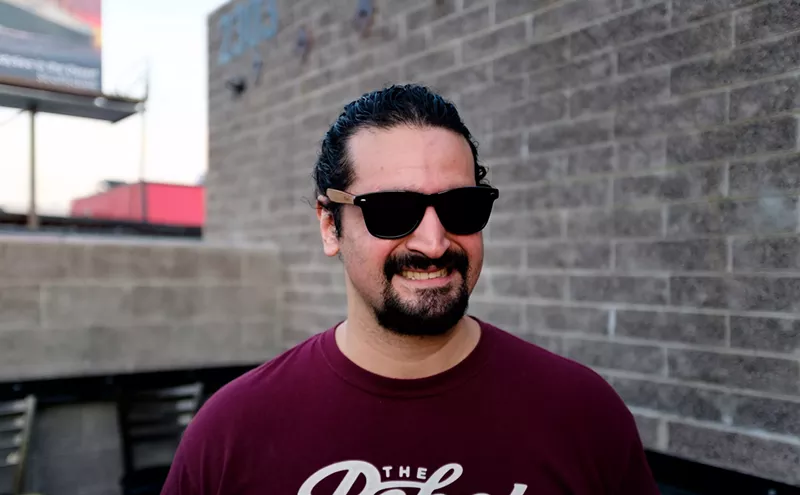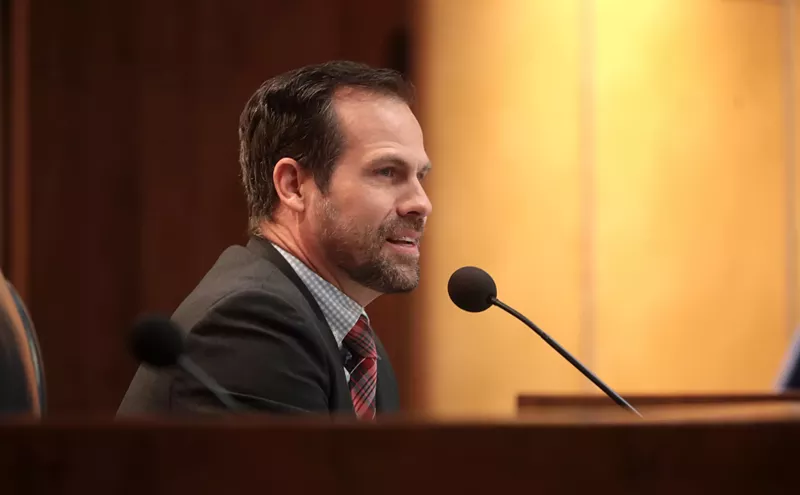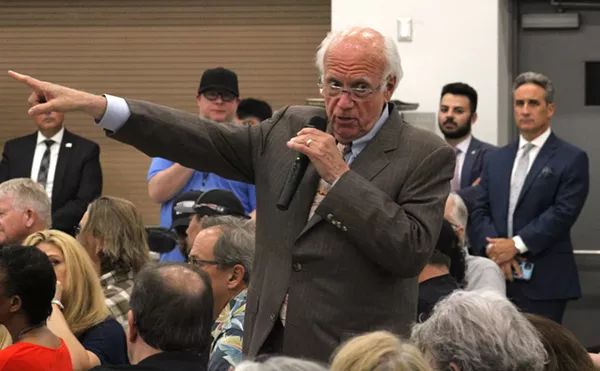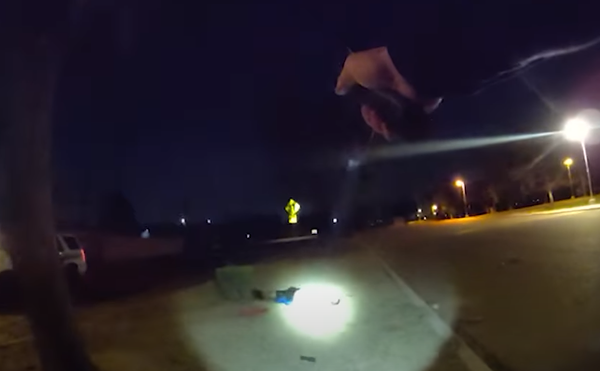The state Court of Appeals has ruled that the scent of marijuana alone can no longer be used as probable cause for a search warrant in Arizona because of the 2010 Medical Marijuana Act.
Tuesday's ruling provides more legal protection for medical-marijuana users and industry workers, as well as for anyone involved with the plant. But don't go puffing willy-nilly on that blunt, thinking cops are likely to ignore the distinctive, herbal odor — this new ruling comes with several important caveats.
On its face, the 2-1 ruling in the Division Two appeals court is a no-brainer: Marijuana is legal in Arizona for 65,000-plus qualified patients and the hundreds of dispensary workers, cultivators, caregivers and cannabis chefs who are legally allowed to possess it. Depending on the circumstances, marijuana that's emitting an aroma might be legal. Conversely, the people possessing, growing or using it might be doing nothing illegal.
With this ruling, officers now need what the appellate court called "odor-plus." That is, a judge can't issue a search warrant until the officers asking for it present evidence of a crime that involves more than just the smell of weed."This opinion recognizes that your home should not be searched unless there's a really good reason for it." David Euchner, Pima County public defender
tweet this
David Euchner, one of two assistant Pima County public defenders who prevailed in the ruling, tells New Times the ruling is one of the most important Fourth Amendment cases he's seen in Arizona.
"This opinion recognizes that your home not be searched unless there's a really good reason for it," Euchner says. "It reaffirms the very American principle that you have a right to privacy in your own home."
The case began on March 14, 2013, when South Tucson police officers on patrol near South Sixth Avenue and West 35th Street noticed a powerful, pungent smell coming from a nearby row of warehouses. Believing the source of the smell to be a large quantity of fresh marijuana, the cops obtained a search warrant from a local magistrate. A 2013 news release from the city of Tucson about the bust didn't tell the whole story. As the appellate court ruling states, police raided the warehouse in question with a SWAT team — and found nothing but a vacant warehouse.
But that nagging, "overpowering" odor of marijuana persisted. So police obtained a second warrant for a warehouse unit next door, again based on nothing but the smell. This time, the raid uncovered a "sophisticated" grow operation with 357 plants, plus 53 pounds of marijuana that had already been grown. The investigation showed that part of the warehouse was being used as residence for Ronald Sisco and his 22-month-old child, who weren't home at the time.
As a Tucson newspaper reported, Sisco turned himself in once he realized cops were looking for him. He was charged with felony possession of marijuana, growing marijuana, narcotic drug possession and child abuse. (The latter charge because the child had been exposed to the grow operation.)
Sisco and his public defenders challenged the validity of the search warrant based on the voter-approved, 2010 Arizona Medical Marijuana Act (AMMA), even though Sisco himself wasn't a registered patient. The appeals court agreed with their argument. Sisco's case was remanded back to trial court, but it's essentially over because the evidence gathered from the search warrant can't be used.
In arguing against Sisco's position, prosecutors with the Pima County Attorney's Office said that even considering the 2010 law, it was likely such an overpowering odor meant illegal activity.
"But the state presented no evidence ... supporting this intuition in the era of the AMMA," the two affirming judges, Peter Eckerstrom and Michael Miller, stated. "In the absence of such data, and given that hundreds of Arizonans and scores of dispensaries now have permission to lawfully cultivate or store marijuana, the magistrate had no basis to assume that most warehouses currently containing marijuana in Arizona do so illegally."
Noting that previous case-law bans police from searching "everyone they deem suspicious" to find out if a crime is occurring, the judges declared that "demanding some circumstantial evidence of criminal activity beyond the mere scent of marijuana strikes that reasonable balance."
The ruling shouldn't impair law enforcement, the ruling says, because police should be able to come up with other circumstances if a crime is being committed.
"For instance," the ruling states, "even with the AMMA's passage, the odor of burnt marijuana in public or in an automobile still suggests a crime has occurred."
The ruling notes that a Tucson police sergeant admitted during the case that police sometimes get it wrong — that is, they've smelled marijuana, conducted raids and found marijuana only to discover that nothing illegal under state law was going on. The sergeant said the department's policy is typically to sort out whether the activity is legal under the AMMA only after a search warrant has been served.
"Were we to adopt the state's suggestion that scent alone furnishes probable cause of a crime, medical marijuana patients would become second-class citizens, losing their rights to privacy and security, including privacy within their own homes," the judges wrote.
Euchner says the ruling applies more to smells coming from a home than anywhere else. The AMMA prohibits public smoking, so if an officer thinks she smells burnt marijuana in a parked car at the mall, that still means something illegal probably happened, giving probable cause for a search warrant to be issued.
The judges mentioned that marijuana is still a crime under federal law, and that the ruling applies only to state law. The ruling also applies only to the legal concept of probable cause. The law still allows police to detain someone briefly and even give them a quick, warrantless search if they have "reasonable suspicion" that a crime has occurred.
In the real world, then, the ruling probably won't have much effect — cops will still act when they smell marijuana.
Even with those exceptions, the majority ruling was too much for the third judge, Philip Espinosa, who wrote a lengthy dissent. The other two judges wrote of the possibility that someone might be growing marijuana legally in Tucson for a cancer patient in a remote part of the state, but Espinosa called that an "absurd" scenario. Even in a case like that, in which the Tucson caregiver would be protected under the AMMA because the patient lives more than 25 miles from a dispensary, the caregiver would be limited to 12 plants for that patients — and those plants wouldn't smell that much, Espinosa wrote.
However, Espinosa seems to have forgotten that the caregiver could be growing legally for up to five patients, and the smell of 60 plants might indeed emanate from a home.
In any case, Espinosa says the "foreboding" depictions by the affirming judges of police invading the homes of people with debilitating medical conditions because of the smell pot "only serve to raise alarmist fears not relevant here."
While the two judges claim the warehouse "conceivably could have been an authorized marijuana dispensary," the facts of the case showed that was highly unlikely due to the lack of lighting security and other mandatory requirements for dispensaries, he wrote.
Of course, many of these consideration could become moot if Arizona voters legalize marijuana for adult use next year. In Oregon and other states that have legalized marijuana for general use by adults 21 and older, for example, marijuana-sniffing dogs are being phased out.
Got a tip? Email Ray Stern
Follow Ray Stern on Twitter: @RayStern
Follow Valley Fever on Twitter: @ValleyFeverPHX












